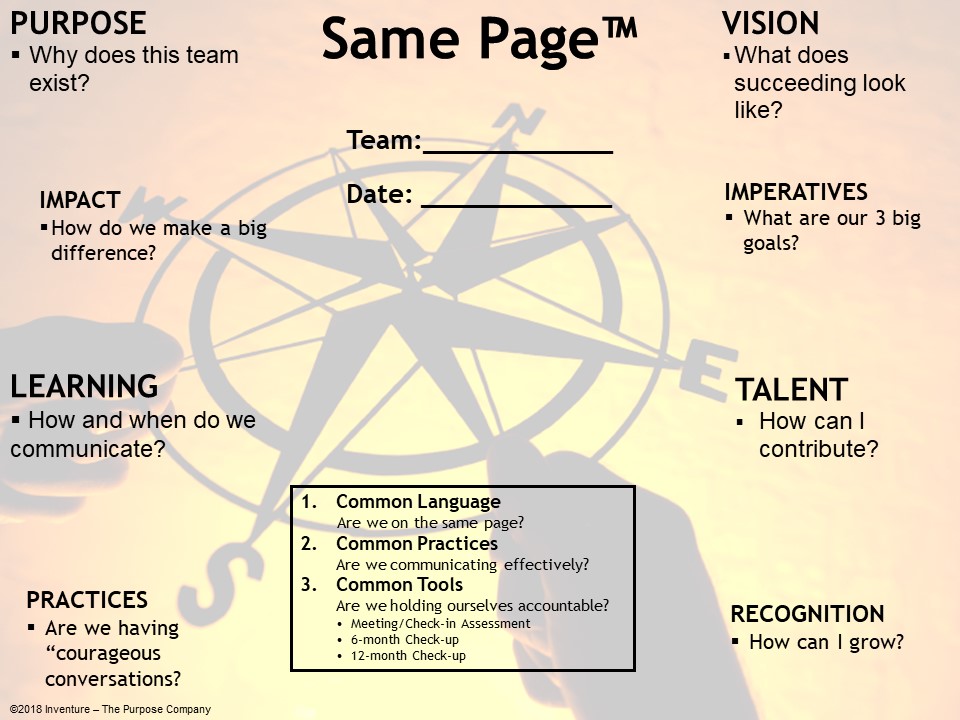Every team has a purpose. More teams fail through lack of purpose than lack of effort. Do you have a purposeful team?
Does your team have a clear purpose? Why does your team exist? How does your team contribute to your organization’s purpose?
Without purpose, your team will go nowhere… fast. Here’s how to uncover your team’s purpose to keep everyone engaged.
Most teams are packed with people who have the potential to do great things. Yet, many leaders are not unlocking that potential, and that is one of the reasons we have an employee engagement challenge.
To engage both hearts and minds, you have to have a compelling team purpose that resonates with people and makes them want to get out of bed every day to come to work. You have to have a compelling vision of success that inspires your team.
Why?
Your team purpose needs to answer the most fundamental question: “Why do we do what we do?” To answer this question, it is essential for teams to engage in regular conversations beyond what it is they have been tasked to do to get on the same page around why they are here to do what they do. These conversations focus on both individual behaviors and those of the group as a whole.
Ask these four questions to build a purpose-driven team. If your organization has a stated purpose, connect your team’s work directly to it. Take the initiative to define a purpose for your team.
Is there team commitment to our purpose, vision, learning, and talent that creates an aligned and agile team? When clearly articulated and communicated well, the SAME PAGE practice can keep us focused and energized. Without being on the “same page” team meetings can quickly dissolve into a list of confusing, competing, and political projects that absorb precious time and valuable resources.
Same Page™
The Same Page™ is a tool to help you discuss your team purpose and to create practices and milestones around it. A team must have a purpose just like an organization must, so being on the “same page” is important at whatever level you lead.
The fundamental four questions that every team member asks, whether or not they ask them aloud are:
- Purpose – What’s our reason for being?
- Vision – Where are we headed?
- Learning – What’s the way we work best together?
- Talent – How can I contribute?
To paint a clear picture of your purpose, it’s essential to be intentional about answering these questions. Purposeful teams personally connect to their purpose and understand the role they play in their organization’s big picture. The team spends time gaining an appreciation of their stakeholder’s needs and wants, and the importance of the team’s performance in contributing to broader organization goals.

Where do you see your team today?
Is your team aligned on purpose? Are they on the “same page?”
(Write the number closest to where you see your team today.)
SCALE: 1 = COLLECTION OF INDIVIDUALS / 3 = GROUP / 5 = PURPOSEFUL TEAM
SCORE: ___
Giving teams a greater sense of purpose is every leader’s job. Purpose is bigger and deeper than goals. It offers a compelling “why.” Purpose adds value to the daily tasks. It boosts morale.
The Same Page™ Quiz
Answering four fundamental questions creates a thread that connects today’s tasks to the broader team and organizational purpose. Without purpose, team members might achieve short-term results, but they won’t have the heart to go the distance. With purpose, they naturally will be more engaged with their work because they’ll clearly sense that they are part of something bigger.
Imagine a team clear on both their individual purpose and their collective purpose. Sound like a great place to be? This could be your team. Set aside time with your team to have a “courageous conversation” about its purpose. Consider answering the following four questions as a team.
INSTRUCTIONS
Four Same Page™ elements are outlined. For each element, two descriptors are provided at opposite ends of a scale. Read the paragraph describing the dimension and then indicate where you see your team today.
#1 – PURPOSE
Failed teams rarely develop a common purpose. Aligned teams invest time and energy clarifying and committing to a purpose that belongs to them both collectively and individually. Are we clear on “why” we do what we do? Are we aligned around a clear, compelling purpose?
SCALE: 1 = NOT ALIGNED / 5 = ALIGNED
SCORE: ___
#2 – VISION
Failed teams focus on today’s problems in allocating meeting time. The question is: What is the context for the agenda? Is it current problems or future vision? Purposeful teams know where they’re going and envision the future state they are working towards. Are we clear on what “succeeding” looks like?
SCALE: 1 = NOT ALIGNED / 5 = ALIGNED
SCORE: ___
#3 – LEARNING
The future belongs to the learners – not the knowers. Failed teams fail to learn quickly. Purposeful teams are always learning. Every meeting is viewed as an opportunity to learn on purpose. Are we having courageous conversations? Safe conversations occur when “sacred cows” cannot be talked about, said, or shared. “Courageous conversation” is the norm – a willingness to risk transparency, to put in front of the team what really is occurring or what is getting in the way.
SCALE: 1 = NOT ALIGNED / 5 = ALIGNED
SCORE: ___
#4 – TALENT
Engaging the full range of talents is a critical factor to the success of a team. Do we have the right people “on the bus?” In the “right seats?”
Actions and tasks are considered on individual work styles to fully leverage different strengths of team members, to ensure the talent of the team is fully engaged. If our individual strengths are limited by our organization roles, we will not realize our team potential. Are we playing to our individual strengths?
SCALE: 1 = NOT ALIGNED / 5 = ALIGNED
SCORE: ___
The Same Page™ Summary
ALIGNMENT
Total the score for each number.
TOTALS
1 ___ 2 ___ 3 ___ 4 ___ 5 ___
SCALE: 1 = COLLECTION OF INDIVIDUALS / 3 = GROUP / 5 = PURPOSEFUL TEAM
SCORE: ___
COLLECTION OF INDIVIDUALS
If most of the scores were 1 or 2, your team is functioning primarily as a collection of individuals. The team is either forming or is individual-centered.
GROUP
If most of the scores were 3, individuals are responding as a group. Members are forming a group identity, clarifying their roles, beginning to align on mission, and establishing norms for working together.
PURPOSEFUL TEAM
If most of the scores were 4 or 5, essence is present. Energy is focused and members share courageous conversation. Your team is becoming purpose-driven. On a quarterly basis, do a team member “check-in” to share what gives each member meaning and how their individual work connects them to the purpose of the team and the organization. Make it a practice every month to review your Same Page™ and discuss the four key components – Purpose, Vision, Learning, and Talent.
Becoming a Purposeful Team Leader
Take a moment to reflect on your leadership. Focus on service. Purpose is not purposeful without serving others. It is not self-expression for its own sake; it is self-expression that creates value for those around you.
For each element below, give yourself a rating on a scale of 1 to 5 – with 1 being “not true”, 3 being “somewhat true”, and 5 being “true.”
1. ___ I regularly talk about our purpose with my team.
2. ___ I regularly talk about how our team work makes a difference, an impact on our organization.
3. ___ I make space for purpose discussion in our team meetings.
4. ___ When coaching people, I discuss how their work connects to our team purpose.
5. ___ I recognize team members for their contributions related to our purpose.
6. ___ I try to shape tasks and roles to fit each team members unique gifts.
7. ___ I try to help team members find their “best fit” in the team.
8. ___ I expect my team to hold transparent, “courageous conversations.”
9. ___ I energize my team to set a clear and compelling vision.
10. ___ I hold myself accountable for keeping the team aligned on purpose.
Scoring
10 – 20 / Time to get started on completing the Same Page™ with your team.
21 – 30 / You’re starting to become a purposeful team leader; to move up, choose one action to do more of or to start doing.
31 – 40 / Keep up the good work! Share your Same Page™ insights with your mentor or Sounding Board. Gain feedback on becoming more purposeful.
41 – 50 / Celebrate purpose by sponsoring a team celebration to acknowledge team efforts to work on purpose!
What does your score tell you about how you lead purpose now? Where can you grow to become a purposeful team leader?
*********************************
 Richard Leider, founder of Inventure – The Purpose Company, is one of America’s preeminent executive-life coaches. He is ranked by Forbes as one of the “Top 5” most respected executive coaches, and by the Conference Board as a “legend in coaching.” Richard has written ten books, including three best sellers, which have sold over one million copies and have been translated into 20 languages. Repacking Your Bags and The Power of Purpose are considered classics in the personal development field. Richard’s PBS Special – The Power of Purpose – was viewed by millions of people across the U.S.
Richard Leider, founder of Inventure – The Purpose Company, is one of America’s preeminent executive-life coaches. He is ranked by Forbes as one of the “Top 5” most respected executive coaches, and by the Conference Board as a “legend in coaching.” Richard has written ten books, including three best sellers, which have sold over one million copies and have been translated into 20 languages. Repacking Your Bags and The Power of Purpose are considered classics in the personal development field. Richard’s PBS Special – The Power of Purpose – was viewed by millions of people across the U.S.


